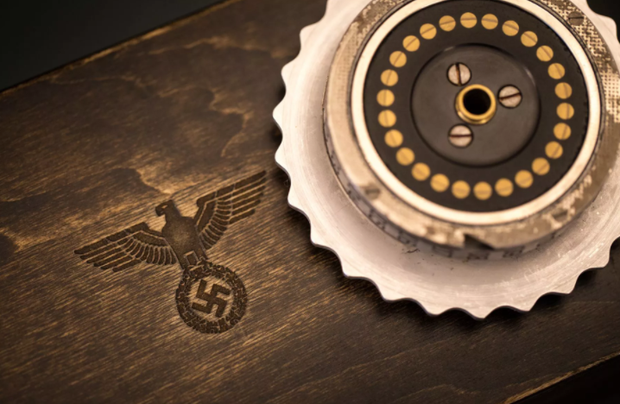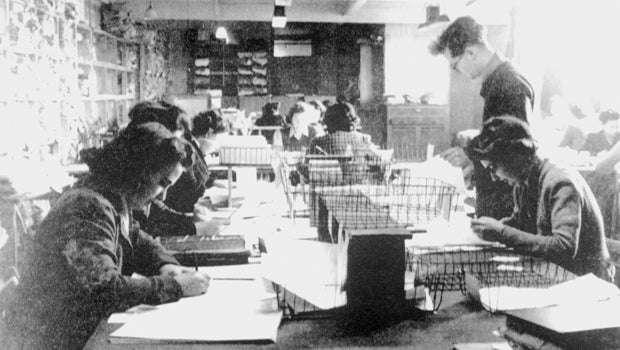During World War II, dozens of women students at Cambridge University worked around the clock in complete secrecy to crack Nazi codes, but only now are the unsung heroes getting recognition.
At least 77 students from the women-only Newnham College were drafted to Bletchley Park, the code-breaking center north of London, during the conflict.
It was there that mathematician Alan Turing decoded messages encrypted by the Nazis’ Enigma machine, in particular those sent by German U-boats submarines in the North Atlantic. Enigma cyphers were used by the Germans during World War II to scramble military communications and intelligence, to such an extent that they trusted their code was unbreakable.
Historians widely acknowledge that Bletchley played a key role in bringing down Adolf Hitler. The team that worked in the secret installation outside of London is credited not only with cracking Enigma, but also the Lorenz, another device that the Nazi high command used to send coded messages.
But the story of the Cambridge women has only recently been revealed, thanks to research started by Sally Waugh five years ago. She worked with historian Gillian Sutherland and archivist Frieda Midgley to uncover the names of the Bletchley Park recruits from Newnham College, the BBC reported.
Andrew Hoyle/CNET
Waugh, a 69-year-old former Newnham student and teacher, said she wanted to highlight the role of women during World War II, often ignored in history books.
“Nobody was ever able to say thank you,” she told AFP. “I had no idea that people from Newnham went to work at Bletchley Park”.
Then, one day, she came across an article mentioning the name of an old friend, Jane Monroe, who died in 2005.
When Monroe, a mathematician from Newnham, was asked what she had done during the war, she replied unfazed: “Oh, I made tea,” said Waugh.
“She was in reality a code breaker. She was a friend but she didn’t tell me,” Waugh explained.
Monroe was unable to talk about her role as she had signed the Official Secrets Act, which restricts the publication of government information deemed sensitive.
The article mentioned three other women, whom Waugh tracked down in the university’s archives.
“I thought, if there are four of them, I wonder if there are any more?” she recalled.
The Sherborne School
In fact, Waugh found around 20 names and then cross-referenced her information with Bletchley Park.
Together they were able to identify almost 80 women.
“Everything was quite mad, really”
The only one whose name has so far gone down in history is mathematician Joan Clarke, who was recruited in 1940 and worked with the celebrated Enigma decoder and computer scientist Turing, to whom she was briefly engaged.
She became deputy head of her unit and after the war continued to work in intelligence. Keira Knightley won an Oscar nomination for her portrayal of Clarke in the 2014 film “The Imitation Game.”
Also on the list is Violet Cane, another mathematician with a gift for statistics. She worked at Bletchley’s naval section between 1942 and 1945. Another code breaker, Mavis Batey, spoke to CBS News in 2008, when she was 87, about working at Bletchley Park.
“Everything was quite mad, really,” said Batey, who was responsible for decoding a message that revealed the date of a planned Italian naval attack and, in turn, allowed the British to prepare.
German speaker Elizabeth Langstaff was given the tasks of reconstructing German messages from raw decryptions, interpreting abbreviations and analyzing the results over months.
Three women — Alda Milner-Barry, Pernel Strachey and Ray Strachey — helped recruit women to Bletchley Park from Newnham College, the BBC reported. Milner-Barry by then had been a fellow and vice principal at the school, and her brother belonged to one of the government code and cypher school groups at the Bletchley code breaking station. Pernel Strachey was the Newnham principal, and her brother was an expert in deciphering coded messages, according to the BBC.
At the end of 2023, a letter was uncovered dated Jan. 28, 1939, in which the principal of the university confirmed to Bletchley Park that “in the event of emergency we should be able to find for you about six students proficient in Modern Languages, in order for work to be carried out at the Foreign Office.”
Newnham, which was founded in 1871, eventually sent Bletchley mathematicians, linguists, historians and even archaeologists to analyze aerial photographs.
“Newnham women were represented in most key areas of Bletchley Park’s work,” Jonathan Byrne, Oral History Officer at Bletchley Park Trust, told AFP.
That included decrypting German signals encrypted by Enigma, producing intelligence reports, understanding the activities of the Nazis by analysing signal networks and studying diplomatic signals.
Around 50 of women were believed to have been on duty on June 6, 1944 — “D-Day”, when Allied forces landed on the beaches of Nazi-occupied northern France.
“Although the work they were involved in contributed to Allied planning for the liberation, most would have not known when the invasion was happening,” explained Byrne, though some may have suspected.
“German signal traffic in France increased in response to the invasion, making early June 1944 a busy time at Bletchley Park,” he explained.


